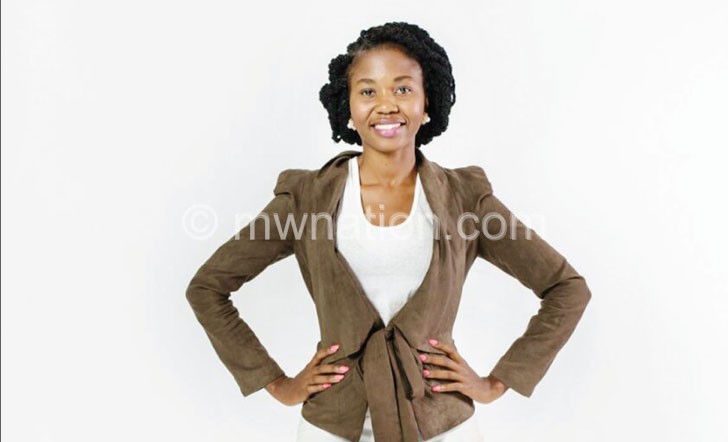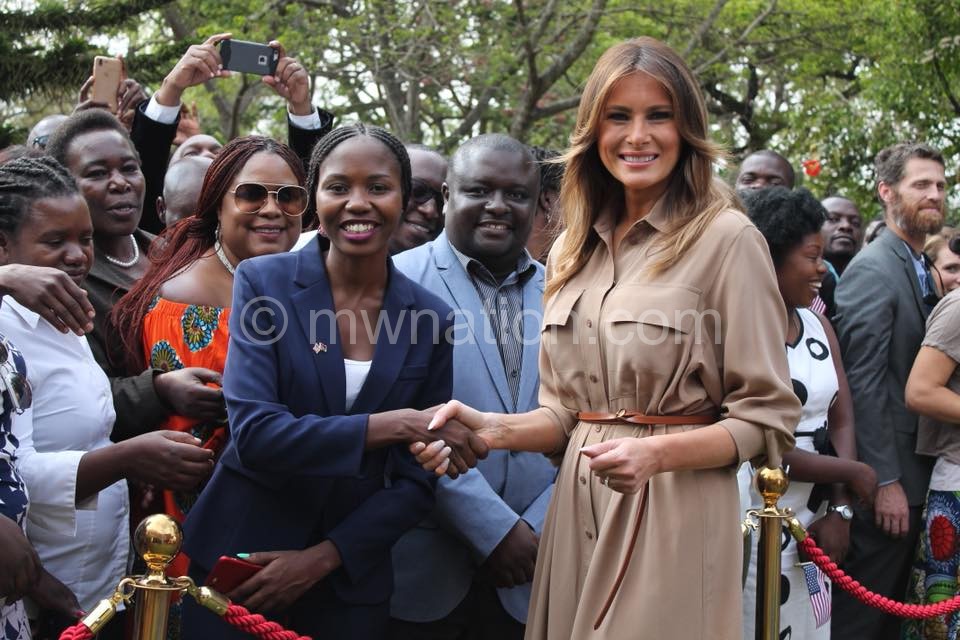Tendai Banda: 2018 Inspirational woman of the year
For most people, achievement is defined by a great job, success, plenty of money and property.
But for Tendai Banda, all she wanted from a young age in her life was to be useful.

To that end, she found herself volunteering for various organisations such as the Youth to Youth Empowerment, Age Africa, Maphunziro 265, Kwera Fund.
Tendai was voted the 2018 Inspirational woman of the year by Gesu Awards and she also won the Mandela Washington Fellowship Award of 2017 after a retrial having failed two years before.
Gesu (Italian for Jesus) Awards rose out of what’s-up Gesu- an online ministry designed to embrace, educate and empower women by raising what its founder Ethlet Miscot terms a, ‘woman with a difference.’

The awards started in 2017 to celebrate women making a difference in communities in Malawi.
Tendai trains young people in soft skills, motivates young girls to aspire for more and achieve using education.
She also mentors both boys and girls on their career ambitions.
Tendai says she learnt about the Gesu Awards when they were calling for nominations of outstanding women in various Facebook groups.
When people mentioned her name, she was humbled to learn that people were noticing her work and are being inspired. It motivated her to keep going.

Today, she counts having motivated 1 500 young people from 20 schools, 2 500 in youth events such as conferences and girl guide camps; and 30 that she has engaged in personal mentoring.
She notes that most of her successful motivation exercises have been the ones done one on one.
And doing these gives her a sense of personal fulfilment in the knowledge that she is helping people accomplish something in life.
Getting feedback from the youngsters after a session, how they relate to what she is saying or when someone gets a job after they work together on an application, she says is her greatest return.
“The one I am most proud of is of a young man I engaged with from the moment he learnt he got a scholarship to study accounting at Zanzibar University. We went through the process of preparing for his trip together,” explains Tendai.
Having encouraged him throughout his study, she is proud that he has graduated from the university with a distinction- adding that their job together is not done.
“The list goes on, but I would like to underscore the fact that most of the times, we keep asking ourselves about how we can contribute to Malawi’s development. I found that a sure way is one person at a time,” she says.
Alina Mwasinga, a mentee says Tendai helped her develop confidence and discover herself.
With Tendai’s help, she got selected to this years’ Mandela Washington Fellowship.
She now is the voice of the voiceless and mentors youths at Dzaleka Refugee Camp.
Tendai states that having someone who can benefit from one’s skills, audience and time should be what ought to be offered to others.
She adds that and it goes a long way to hear about how much their lives change for the better because of the help one gave.
Asked if she single – handedly organises these talks, Tendai says she either gives motivational talks with youth groups she is a part of, while the rest are through invitation by people or organisations who have heard about what she does.
Recalling her volunteer work, she says she was given a unique platform to use her educational skills and life’s experience to give back to her community
Adding that the Mandela Fellowship is also a big influence to her work having learnt about servant leadership.
Realising who she is helped her understand better ways of doing things and improving her work.
Fellowshipping with other young leaders from across Africa also meant learning from them what she could not at home.
During the fellowship, Tendai spent six weeks in professional development at a United States of America organisation, Atlas Corps.
She believes this helped her learn to work in a fast paced environment and take on some work ethics which she applied to her work with Unicef and later on with the United States Embassy’s public affairs section, her current job.
The exposure to a different experience also had a positive impact on her life.
Her quest was to learn to become a great leader and she believes the Mandela Washington Fellowship trained and branded her better for her work with young people.
“I want young people to aspire for greatness because I believe I missed out on some opportunities,” she says.
She doesn’t want them to go through the same, hence, by using her experience, Tendai hopes they reflect on how they can do things better and plan for their success.
“I want them to believe that if I was able to overcome all the challenges I faced, they can do it, too, but so much more than me,” she says.
Listing the Mandela Fellowship as a time she almost gave up as being fit for the programme, the award winner says the tide only turned with a friend’s encouragement and help—keen on following instructions and a realisation she had chosen the wrong track earlier.
“If I didn’t have challenges, I would be a robot,” she says.
She had some dreams which never came to pass whether in her personal or professional life, but knowing that she could try again or look for other opportunities have brought her, this far.
To overcome, she says she learnt to love herself: “I believe that we don’t invest much in becoming better people before we join ourselves to the world.
“My life changed when I knew that, as a person, I am going to fail, but will have to pick myself up, take time to heal and get back with life,” says Tendai.
As a leader, she realised the need to invest in knowledge and experiences enough to share with the people who look up to her.
She believes this has built her into a much stronger person.
Her final straw in building herself was in embracing the fact that everyone is on a journey, but using different paths.
This helped her to stop comparing herself with others and realised that her path is different; hence, she should celebrate the small achievements which are big milestones to her journey.
Her current job also involves working with young people— encouraging them to do amazing things either in academics or community work.
In promoting girls, Tendai trusts that a decent education for girls is a pathway to opening their minds to a world of endless possibilities.
Having met young women who have achieved so much from education, she wants that to be the norm for any girl or young woman.
She observes that menstruation hygiene management is also an important factor for girls and young women in Malawi which is experienced differently, with some being happy, others having a horrific experience every month.
Tendai says enough knowledge and comfortable safe sanitary materials can keep girls going in their education and social spheres.
“I have given period positive talks to about 300 girls in my community as well as conducted a pad making workshop as part of my 2017 Mandela Washington Fellowship project to encourage girls to still go to school even during their menstruation. There is more that needs to be done in the field,” she adds.
On the other hand, she says support is very important. Some women, she notes, are born confident while others need someone to encourage and reassure them that their dreams are still valid.
She says girls need to want to be achievers: “You have to be hungry enough for your dreams as nobody is going to do that for you considering they are busy trying to do that for themselves.”
Inspired by Nelson Mandela’s words: “What counts in life is not the mere fact that we have lived. It is what difference we have made to the lives of others that will determine the significance of the life we lead.”
The 29-year-old holds a master’s degree in development studies and a bachelor’s degree in humanities from University of Malawi, Chancellor College.





